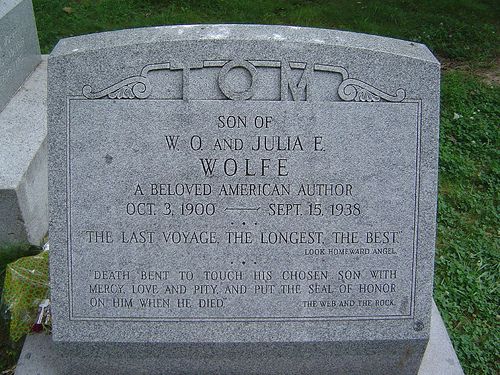The Rev. Noah Van Niel
The Chapel of the Cross
July 4, 2021
Proper 9 (B Track 1): 2 Samuel 5:1-5, 9-10; Ps 48; 2 Cor 12:2-10; Mark 6:1-13
In 1940, the novelist Thomas Wolfe, a son of the Old North State and Carolina grad, published a book with the memorable title, You Can’t Go Home Again. I say he published it but that’s not quite true. It was published by his editor and released posthumously, two years after Wolfe’s untimely death at just 37 years old, silencing what some considered the most original and talented American literary voice of his generation (which is saying something because he was writing at the same time as Faulkner, Fitzgerald, and Hemingway).
Wolfe may not have lived long, but he had learned the hard way that “You can’t go home again.” In his first book, he had painted a less than flattering and less than fictional picture of his hometown of Asheville and the people in it. This made him a less than welcome figure in their eyes. Who was this guy, son of a gravestone carver, youngest of the eight Wolfe pups, to embarrass them to the rest of the world? And they took offense at him. As a result he stayed away a full eight years before coming home again, and even then, it was just for a visit. He just couldn’t go home again.
Jesus didn’t write any provocative novels after he left Nazareth, but he was saying and doing some provocative things. Incredible things, amazing things, but provocative all the same. When he came back to Nazareth, the hometown crowd was curious, but wary. He had changed. He was preaching, teaching, healing with an authority that did not befit the boy they knew. The boy who worked quietly at the plane and laith and skipped with his siblings through Nazareth’s dusty streets. As impressive as he is, he doesn’t fit the old form of who he was; who they understood him to be. And they took offense at him. And thus, Jesus famously says, “Prophets are not without honor, except in their hometown, and among their own kin, and in their own house.” In other words, “You can’t go home again.”
But what exactly is the problem? Why is it so hard to go home again? I think it has to do with our tendency to operate with fixed structures of understanding, and our reflex to reject the new: new ideas, new practices, new people. The citizens of Nazareth knew who Jesus was. But somehow, he was no longer that, and so it didn’t compute. And, as we know, people can get aggressive or defensive when something threatens or violates their conceptual framework. We don’t like things that challenge our ways of understanding. That is true of us now, and it was true then. And so the people of Nazareth shut him out. “Others will do the same,” Jesus warns his disciples before sending them out into the mission field. They will literally slam the door in the face of those who come preaching a new message of peace, redemption, and love simply because it’s new. And welcoming a new reality into the mix, even one as nice as the one Jesus is offering, means your previous understanding of the world is lacking, incomplete—maybe even downright wrong. And we would rather be right than wrong. So we resist the new, and we slam the door when it comes knocking. And when Jesus encounters such fierce resistance, there’s not much he can do. He is unwilling to force his way into unwilling hearts. Persuasion, not coercion, that is his way. All he can do is shake the dust off his feet, and move on.
I wonder, how welcoming of the new are we? Are we able to integrate something fresh and flexible into our firm and fixed understandings? Or are we in danger of emulating the cold-heartedness and closemindedness of the citizens of Nazareth? People have various ways of answering that question; varying degrees of attachment to the old and openness to the new. Because on the one hand we need structures of understanding to get on in the world, but on the other hand we also want to be able to adapt and grow as human beings. It’s a paradox with no exact solution. In fact, I would argue that our different ways of answering this question are responsible for many of the social conflicts of our time: how much weight do we give to old ideas and ways of doing things, and how much openness do we feel towards that which is new or different than what we know? This is not an easy calculation to make. Not everything new is good. Not all change is progress. But if we cling too tightly to the past, that is where we’ll stay. So how should we, as Christians, approach this question? How can we hold thoughts, ideas, and opinions strongly enough for them to keep us stable, keep us grounded in values and virtues that we believe make us good people, without holding to them so tightly that it shuts us off from the possibility of becoming better ones?
Again, there is no easy answer. But it is worth remembering, that while there is much to be valued and appreciated from the past, at a fundamental level the God we believe in, is a God of transformation; of conversion, of redemption, of resurrection—of doing a new thing. Jesus was a new thing; he came knocking on our door to offer new news, not just good news. Therefore, it is essential to the Christian life that we remain open to God doing a new thing in our lives – at our door—and embrace, not resist, the possibility of change. Only then will we be able to be, as St. Paul says, transformed into the image and likeness of God, that is Jesus Christ; transformed gradually, he says, “from one degree of glory to another” (2 Cor 3:18).
God wants to do a new thing in us, in our world. That does not mean that every new thing comes from God. But it does mean that for us to fulfill our Christian calling to become more and more Christlike, we cannot be afraid of change, we cannot resist transformation. This may sound ironic because often it is the Church clinging most tightly to the ways of the past and resisting most strongly new ideas and practices. But if we are not open to the new, we will foreclose any chance at experiencing even yet more wonderful blessings and possibilities for our life and for our world. If we hold too firmly to previous understandings, then when new revelations appear, when new ideas are spoken into being, when people have new news to share with us, we will reject them out of hand like the people of Nazareth who ran Jesus out of town, or the inhospitable homeowners who slammed the door in the disciples’ faces. Such attitudes prevent God’s work of transformation ever taking place: for when Jesus encountered such attitudes, “He could do no deed of power there.”
But if we can stay open to the possibility of the new, if we can embrace the possibility of transformation, then we have the chance to go where God is calling us go; grow into who he is calling us to be. People who are more loving, more compassionate, more merciful, more just, more like Jesus. Who knows how much better life could be if we are willing to follow more fully in his ways. Who knows what might be possible for us and our world if we could be changed, even just a little bit more, into his likeness? Maybe doors that were slammed shut could creak back open. Maybe relationships that were broken could be made whole. Maybe, just maybe, it wouldn’t be so hard to go home again.
Thomas Wolfe ended up spending most of his short life travelling, always staying far away from home. He lived in Boston, New York, England, Germany, Italy, France, and Switzerland among other places. When he got sick, he was all the way on the other side of America, in Seattle, all alone. But in those last days, something wonderful happened. This peripatetic soul, who felt he could never go home again, who lived at a remove from family all his life, was attended first by his brother, then by his sister, who came all the way across the country to be by his side. And eventually by his mother as well. And together they shepherded him back to the East coast—from Seattle all the way to Baltimore for treatment. And when it failed and he died, they cradled him in their arms. And then they brought him home. Thomas Wolfe lies buried in Asheville, NC surrounded now by his parents and siblings for all time.[1] That is but a glimpse of what is possible. A glimpse of the reconciliation, the love, the peace that is promised to us if we are willing to change, willing to grow in love, willing to embrace a new way of being, or thinking. If we are willing to loosen our grip on the ways of the past, God can do a new and beautiful thing in us and for us and through us. If we are willing, He can transform us. If we are willing, he can bring us home.
[1] http://www.wjcash.org/WJCash2/Prophet.Reader/She.Knew.Tom.Wolfe.Well.htm


